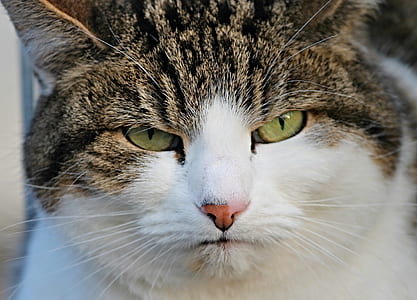Have you ever wondered what it’s like to adopt an old cat? Well, let me tell you, it’s not easy, but it’s totally worth it. Here’s my story of how I became best friends with an old cat and learned to deal with his grumpy moods.

I never owned a cat before, but I always liked them. They seemed so independent and mysterious, unlike dogs, who are always eager to please and follow you around. Don’t get me wrong, I love dogs too, but I live in a small apartment and I don’t have the time or space to take care of one.
So, when my family friends told me that their cat was getting too old and immobile to be getting harassed by their hyper dogs all the time, I offered to take him in. They were happy to hear that, because they didn’t want to put him down, but they also didn’t want him to suffer. They said he was 15 years old, which is pretty old for a cat, and that he had arthritis and kidney problems. They also warned me that he was not very friendly, and that he might scratch or bite me if I tried to pet him.
I didn’t mind. I figured he just needed some peace and quiet, and maybe some love. I named him Oscar and brought him home. He was a big, fluffy, orange tabby, with green eyes and a pink nose. He looked like a lion, but he acted like a mouse. He hid under the bed for the first few days, and only came out to eat and use the litter box. He didn’t make any noise, except for an occasional hiss or growl when I tried to approach him.
I was patient with him. I knew he was scared and confused, and that he needed time to adjust. I talked to him softly, and left some treats and toys near his hiding spot. I also did some research on how to deal with cat aggression, and learned that it could be caused by many factors, such as pain, stress, fear, territoriality, or dominance. I learned that I should not punish him for his behavior, but rather try to understand the underlying cause and address it. I also learned that I should not force him to interact with me, but rather let him come to me when he felt comfortable.
Slowly, he started to warm up to me. He began to explore the apartment, and to sit on the couch or the window sill. He also began to meow and purr, and to rub his head against my leg or hand. He even let me pet him sometimes, but only on his terms. He still had his moments of grumpiness, especially when I tried to pick him up or touch his belly. He would hiss and scratch and bite, and then run away. But I didn’t take it personally. I knew he was just trying to communicate his boundaries, and that he still loved me in his own way.
We became homies. We watched TV together, and listened to music. He liked jazz and classical, but hated rap and rock. He also liked to watch birds and squirrels outside the window, and to chase laser pointers and feather toys. He had a lot of personality, and a lot of attitude. He was stubborn and bossy, but also sweet and loyal. He was my buddy, and I was his.
He acted like he didn’t hear me, or like he didn’t care. He probably thought he was doing me a favor by living with me, and that I should be grateful for his company. He was a freeloader, but I didn’t mind. He was worth it.
He lived with me for two more years, until he passed away peacefully in his sleep. I was heartbroken, but I was also happy that I gave him a good life. He taught me a lot about cats, and about myself. He taught me to be more patient, more compassionate, and more flexible. He also taught me to appreciate the little things, and to enjoy every moment. He was my best friend, and I will always remember him.
If you ever have the chance to adopt an old cat, I highly recommend it. It might not be easy, but it will be rewarding. You will make a difference in their life, and they will make a difference in yours. You will learn to love them, and they will love you back. You will become best friends, and you will never regret it.
Related posts:
Feline Behavior Problems: Aggression | Cornell University College of …
Aggression Between Cats in Your Household | ASPCA





